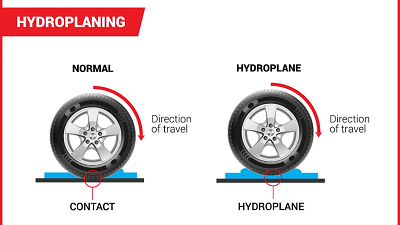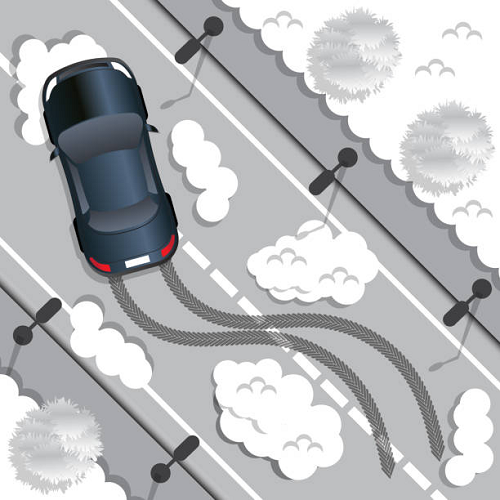Features
Hydroplaning or skidding on roads: What you need to know while driving on a wet surface

My dear motorists, have you ever been faced with that situation where you seem to have lost control of the steering of your vehicle or even stuck in the mud? Frightening right?
Well, the rainy season is upon us again and most motorists especially those who frequently ply muddy roads are bound to experience hydroplaning and or skidding, one way or the other.

Before we commence the discussion on hydroplaning and skidding let’s digress. Do you know that in countries that experience the four seasons: winter, autumn, spring, and summer, motorists are bound to change their tyres depending on the season?
Yes, there are summer tyres and winter tyres to help motorists confidently drive on and navigate slippery roads that come with the changing seasons. That is just by the way. Do we in Ghana, experiencing two seasons see any reason to change tyres seasonally? It’s quite unlikely.
However, motorists must always ensure their tyres are in excellent condition with enough tyre thread – in order not to fail them – especially during the rainy seasons.
Let’s get back on track.
Ever gotten into a situation where you lose control of vehicle traction while driving on a wet or muddy road? Your car seems to be floating because your tyre has no contact with/grip on the road? That is hydroplaning.
Hydroplaning by definition is simply “the condition where the tyres of a vehicle lose contact with the surface of the road due to water on the road.” In this situation, the tyres of the car slide on top of the water and make navigation control impossible.
So what of skidding? Skidding, like hydroplaning is “the loss of tyre traction where the car slides on the surface of the road without necessarily rotating.” There are various causes of skidding which include driving too fast, sharply navigating a turn, oversteering and even hard braking.
My experience with skidding has to do with driving on muddy roads which is a frequent affair during the rainy season. I would personally say a motorist experiences skidding when the car seems to be sliding off a road due to its muddy condition.
The mud prevents the tyre from gaining enough traction on the road. How? So in this case, the mud enters the thread of the tyres making them lose the traction it’s supposed to have and rather makes the tyre slide on the surface of the road.
What to do in the face of Hydroplaning and Skidding
When you find yourself in situations of skidding or hydroplaning, there are some points to remember.
- The first rule to remember is to STAY CALM. Panicking might cause you to veer off the road and cause major accidents.
- Remember, DO NOT STOMP ON THE BRAKES. Instinctively, one’s first reaction may be to stomp on the brake to stop the vehicle but that may even result in being thrown off the road, the car somersaulting or
- causing major road accidents with serious injuries to the driver, other motorists or even pedestrians.
- Take your foot off the accelerator gradually to slow the car down and allow the tyres to regain traction while firmly holding onto the steering wheel.
- And rather steer the car towards the direction you want to go until you are in the right direction again.
The word of caution is to always remember that hydroplaning and or skidding is sometimes inevitable, especially during certain weather conditions like rainy seasons in climatic zones like ours and on muddy roads like we find common in some areas in Ghana – particularly during the wet season.
But always remember to check the condition of your tyres and make sure there is enough thread on them to have better traction, drive slowly on wet roads while keeping a safe distance between you and the car in front of you and always remember to slow down before navigating a curve.
The author is a Communications Professional and a Managing Partner of Andcorp Autos, a fully owned Ghanaian automobile company and on-demand auto purchasing company which offers the best option for purchasing and importing quality vehicles (brand new, clean, salvage) from the USA, Canada and Asia.
Author’s email address: essahjanice@gmail.com
By Janice Osei-Essah Anderson
Features
Traditional values an option for anti-corruption drive — (Part 1)
One of the issues we have been grappling with as a nation is corruption, and it has had such a devastating effect on our national development. I have been convinced that until morality becomes the foundation upon which our governance system is built, we can never go forward as a nation.
Our traditional practices, which have shaped our cultural beliefs, have always espoused values that have kept us along the straight and the narrow and have preserved our societies since ancient times.
These are values that frown on negative habits like stealing, cheating, greediness, selfishness, etc. Our grandparents have told us stories of societies where stealing was regarded as so shameful that offenders, when caught, have on a number of instances committed suicide.
In fact, my mother told me of a story where a man who was living in the same village as her mother (my grandmother), after having been caught stealing a neighbour’s cockerel, out of shame committed suicide on a mango tree. Those were the days that shameful acts were an abomination.
Tegare worship, a traditional spiritual worship during which the spirit possesses the Tegare Priest and begins to reveal secrets, was one of the means by which the society upheld African values in the days of my grandmother and the early childhood days of my mother.
Those were the days when the fear of being killed by Tegare prevented people from engaging in anti-social vices. These days, people sleeping with other people’s wives are not uncommon.
These wrongful behaviour was not countenanced at all by Tegare. One was likely going to lose his life on days that Tegare operates, and so unhealthy habits like coveting your neighbour’s wife was a taboo.
Stealing of other people’s farm produce, for instance, could mean certain death or incapacitation of the whole or part of the body in the full glare of everybody. People realised that there were consequences for wrongdoing, and this went a long way to motivate the society to adhere to right values.
Imagine a President being sworn into office and whoever administers the oath says, “Please say this after me: I, Mr. …., do solemnly swear by God, the spirits of my ancestors and the spirits ruling in Ghana, that should I engage in corrupt acts, may I and my family become crippled, may madness become entrenched in my family, may incurable sicknesses and diseases be my portion and that of my family, both immediate and extended.”
Can you imagine a situation where a few weeks afterwards the President goes to engage in corrupt acts and we hear of his sudden demise or incapacitation and confessing that he engaged in corrupt acts before passing or before the incapacitation—and the effect it will have on his successor? I believe we have to critically examine this option to curb corruption.
My grandmother gave me an eyewitness account of one such encounter where a woman died instantly after the Tegare Priest had revealed a wrong attitude she had displayed during the performance on one of the days scheduled for Tegare spirit manifestation.
According to her story, the Priest, after he had been possessed by the spirit, declared that for what the woman had done, he would not forgive her and that he would kill. Instantly, according to my grandmother, the lady fell down suddenly and she died—just like what happened to Ananias and his wife Sapphira in Acts Chapter 5.
NB: ‘CHANGE KOTOKA INTERNATIONAL AIRPORT TO KOFI BAAKO
By Laud Kissi-Mensah
Join our WhatsApp Channel now!
https://whatsapp.com/channel/0029VbBElzjInlqHhl1aTU27
Features
Emotional distortions:A lethal threat to mental health
Emotional distortions can indeed have a profound impact on an individual’s mental health and well-being. These distortions can lead to a range of negative consequences, including anxiety, depression, and impaired relationships.
Emotional surgery is a therapeutic approach that aims to address and heal emotional wounds, traumas, and blockages. This approach recognises that emotional pain can have a profound impact on an individual’s quality of life and seeks to provide a comprehensive and compassionate approach to healing.
How emotional surgery can help
Emotional surgery can help individuals:
Identify and challenge negative thought patterns: By becoming aware of emotional distortions, individuals can learn to challenge and reframe negative thoughts.
Develop greater emotional resilience: Emotional surgery can help individuals develop the skills and strategies needed to manage their emotions and respond to challenging situations.
Improve relationships: By addressing emotional wounds and promoting emotional well-being, individuals can develop more positive and healthy relationships with others.
The benefits of emotional surgery
The benefits of emotional surgery can include:
Improved mental health outcomes: Emotional surgery can help individuals reduce symptoms of anxiety and depression.
Enhanced relationships: Emotional surgery can help individuals develop more positive and healthy relationships with others.
Increased self-awareness: Emotional surgery can help individuals develop a deeper understanding of themselves and their emotions.
A path towards healing
Emotional surgery offers a promising approach to addressing emotional distortions and promoting emotional well-being. By acknowledging the impact of emotional pain and seeking to provide a comprehensive and compassionate approach to healing, individuals can take the first step towards recovery and improved mental health.
Join our WhatsApp Channel now!
https://whatsapp.com/channel/0029VbBElzjInlqHhl1aTU27
BY ROBERT EKOW GRIMMOND-THOMPSON






